A cross-section of manufacturers at ISK-SODEX 2019 discuss their latest product innovations, digital initiatives and global business strategies. Hannah Jo Uy has the story…
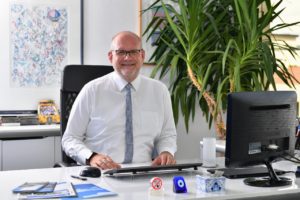
Alexander Kühnel
ISK-SODEX 2019 gave visitors and exhibitors a more distinct and powerful experience with its enriched product range, said Alexander Kühnel, General Manager, Hannover Messe Sodeks Fuarcılık, adding that the exhibition hosted 1,000 participating brands from 35 countries, primarily from Germany, China, France, Greece, India, Iran, Italy, Japan, Lebanon, Pakistan, Russia, Spain, South Korea, Taiwan, Thailand, the United Arab Emirates and the United States, in addition to those from Turkey. “We realized new achievements with our participating companies and industry stakeholders, who attended from a variety of industries, including heating, refrigeration, air conditioning, ventilation, insulation, pumps, valves, installation, water treatment, and fire and solar energy systems,” he said. “Visitors from various professional fields, such as mechanical engineers, managers, maintenance workers, planners and technicians, all came together.”
Kühnel also highlighted the organising company’s partnership with associations and institutions, including ISKAV, DOSİDER, İSKİD, İZODER, TTMD, POMSAD, SOSİAD, ESSİAD, MTMD and KBSB. In partnership with these entities, he said, ISK Sodex aimed to be a platform for discussion on critical subjects shaping the industry and to help exhibitors and visitors establish new partnerships and strengthen existing ones.
“The air conditioning industry is a growing one, with an annual global trade volume of approximately USD 1.5 trillion, and the Turkish air conditioning industry is rapidly developing with strong brands and ever-increasing production efficiency,” Kühnel said. “The Turkish air conditioning industry is a driving force in national exports and aims to achieve USD 5 billion in exports by the end of 2019. These advantages and Turkey’s geopolitical location make ISKSODEX the most significant and leading international air conditioning systems exhibition in the Eurasia region.”
HERE ARE PROFILES OF SOME OF THE PARTICIPATING EXHIBITORS…
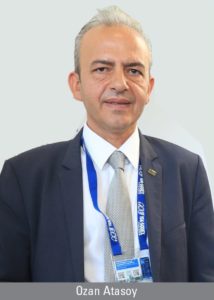
AIOLOS
“Our philosophy is to supply fresh air with environmentally friendly technologies for humans, while providing the same level of comfort,” said Ozan Atasoy, Managing Partner, Aiolos Advanced Air Technologies, as he discussed the company’s product, HybriCool, prominently featured in the company’s stand. Manufactured in Turkey, the HybriCool, Atasoy explained, by cooling fresh air with cooled return air, makes for an efficient system, with the icing on the cake being that it reduces energy required to cool the fresh air by doing so naturally. He said that the product is ideal for commercial projects, such as shopping malls, offices, universities and conferences areas, considering its volume, which starts from 2,500 cubic metres up to 22,000 cubic metres. He added that the product is designed to meet stringent hygienic standards, using UV water treatment for adiabatic cooling and UV filter to keep the legionella at bay.
Atasoy said that a unique feature of the unit is the integration of the control system, which is powered by Belimo. The unit, he said, can be controlled using a cloud-based application, accessible through mobile phones. “We can change any parameter inside, adjust the volume, whatever is needed,” he said, adding that the product is designed to be easily controlled even by those that have little technical knowledge. Using digitalisation to improve ease of use is important in addressing a pressing challenge for such units, Atasoy said, which is installation and maintenance. “When you buy a commercial unit, usually you ask for periodic service agreements, where three or four times a year, service and maintenance people will come and check if everything is okay,” he said. “We do not offer periodic service agreement, we offer preventive maintenance and service agreement. In preventive service agreement, we can monitor everything 365 days a year in our office and record data, and whenever we see something is going wrong, even if the customer is not aware of it, we tell them. This is the most important part of the service agreement. Our HVAC industry is changing, so we are already ready with this kind of integration.”
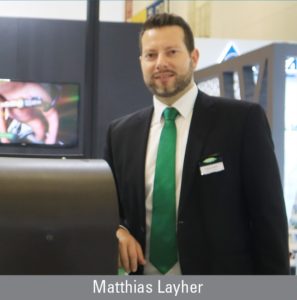 BITZER
BITZER
Bitzer exhibited its range of air conditioning products, in a bid to highlight its OEM business during its participation in ISK-Sodex, said Matthias Layher, Director, Sales AC, Marine and Process, who elaborated on the CSH screw compressor being showcased at the stand. “This, in particular, is a high-efficiency product over standard products,” he said “We achieved that higher efficiency by limiting and adapting compressors to the actual running conditions. In general, that is a trend. The more we adapt and tailor a product, compressor or application to specific conditions, the more we can make it efficient.” Such an approach, he said, is especially vital when it comes to addressing the need of markets such as the Middle East. Layher added that the company has seen strong acceptance among local manufacturers in the GCC region for its products. “We already have existing customers, like Petra, Zamil and SKM,” he said. “Local chiller manufacturers are using these products, and some are testing right now our CSH 6 [compressors]. They also use our variable-speed screw compressor, which is also very efficient, especially when you look at IPLV. This is something we offer to the market, and we have also done some reference projects in the Middle East.”
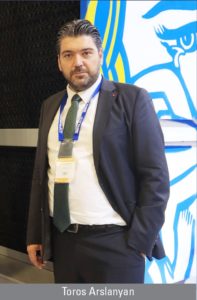 CENK
CENK
Toros Arslanyan, Mechanical Engineer, Closed Circuit Cooling Systems Manager, Cenk, highlighted the Turkish manufacturer’s new range of crossflow cooling towers during its participation in ISK-Sodex. Elaborating on the specifications of the new range of towers, Arslanyan said the product features aluminum fan materials, fill materials made of high-quality PVC sheets and a water basin, which features 600-square meter, zinc-coated galvanised steel material. Arslanyan added that the products are already CTI- and Eurovent-certified. He also discussed the company’s two models of close-circuit cooling towers, a regular model that has a heat exchanger coil material with galvanised steel coils and another model with added fill. “The new series with added fill will help lower electricity consumption,” he said, pointing out that the company aims to support clients in protecting long-term investments by educating them on the importance of integrating chemical dosing and the water filtration system to mitigate any potential risk of legionella and to increase the life of the cooling tower.
He also highlighted the company’s ammonium condenser for cold room applications, adding that such products will gain steady adoption in view of the global move towards environmentally friendly solutions and in view of the fact that ammonia has a comparatively lower price than other natural refrigerants. “Air-cooled condensers don’t condense the ammonium at summer peak temperatures because of low condensation temperatures, but evaporative condenser is the best choice of use with ammonium, because they use wet bulb temperature instead of dry bulb temperature,” he said.
Arslanyan added that in terms of materials, the company’s evaporative condenser exhibits the same high-quality materials as the open and closed cooling towers, pointing out that the coils, which are composed of 26.9 mm diameter and 2 mm thickness hot dipped galvanised steel, make the condensers the best choices for cold room operators. He said that while CENK’s range of products, which includes field-erected cooling towers, open and closed-circuit packaged-type cooling towers, hybrid cooling towers, dry and adiabatic coolers and evaporative condensers, are applicable for all global markets, the evaporative condensers are especially ideal in the Middle East market, which has exhibited a growing requirement for cold room solutions.\
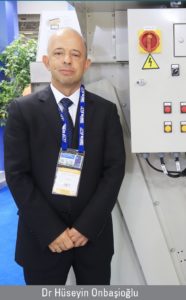 FRITERM
FRITERM
The software development division is currently the most important pillar within Friterm’s R&D process, said Dr Hüseyin Onbaşioğlu, R&D Manager, Mechanical Engineer, who added that the company is developing its own proprietary software to develop and further enhance efficiency and the quality of its own products. “The calculation tools and methodology are developed by us on site,” he said. “We have the flexibility and ability to implement any methodology and any calculation to our software even for very special requirements.” Although digital integration is increasingly becoming common among manufacturers, Dr Onbaşioğlu said, few have the ability to develop their own software, with Friterm possibly the only one in Turkey to do so. He added that this helps improve quality of the equipment the company is manufacturing. “For example, if you are intending to use any new inner grooves tube in an evaporator,” he said, “you need to implement parameters of that tube in your software to be able to calculate the efficiency, performance and other parameters of the system and equipment, which is our competitive advantage.
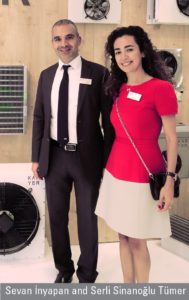 KARYER
KARYER
Flexibility is one of Karyer’s strong points, said Serli Sinanoğlu Tümer, Marketing Executive, Karyer Group, emphasising that the manufacturing company is now exporting to 75 countries across six continents directly from its 38,000-square-metre factory in Turkey. “Working with 75 countries means we have a product range applicable for each region, and we also make custom-tailored production,” she said. “It is a big part of our business, because we think if we can play to the customer’s needs, according to usage, habits and convenience, the product can be demanded in a faster way.” Sevan İnyapan, Sales Manager, Karyer Group, said the company takes into great consideration the environmental impact of its products, which is why there is a steady move to invest in heat-recovery coils, plate-type heat exchangers and rotary wheel type, which is gaining popularity all over the world in view of greater stakeholder interest in energy savings. “We also started to make CO2 products,” he said, adding that standard coils have CO2 versions, as the company aims to align itself with the global shift towards more environmentally friendly refrigerants, which will drive demand for such products.
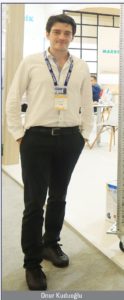 MAKRO TEKNIK
MAKRO TEKNIK
In addition to exhibiting its standard range of HVACR components, Makro Teknik highlighted its new smart profiles during its participation in ISKSodex, said Onur Kuduoğlu, Assistant General Manager, Export. The smart profile, he said, is modular and flexible according to client requirements and can help reduce the time required for installation process, owing to ease of use. The product, he added, is mainly designed for export, and will especially benefit markets in Europe, where stakeholders are incentivised to integrate systems that are reliable and easy to use, because of the high cost of labour. As Europe is a key market for the company, Kuduoğlu said, Makro Teknik is aligning itself with the needs and requirements of customers in the region.
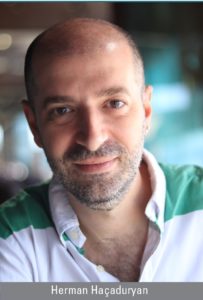 REFKAR
REFKAR
Refkar showcased a new range of heat exchangers at its stand during its participation in ISK-Sodex. Elaborating on the company’s most recent product innovations, Herman Haçaduryan, Deputy General Manager, Sales and Marketing, Executive Board Member, Refkar, added that while the company attracted new visitors from countries as far as Australia, the footfall from foreign participants could be attributed to the work and investment of local organisations. “We have a new heat exchanger for steam, titanium heat exchangers, stainless steel heat exchangers, titanium heat exchangers with plastic body and heat exchangers with boilers, and we are working on other types of heat exchangers that are still under progress,” he said. “I believe within a couple of months, we are able to finalise the testing and everything, and then we will see whether we will be able to put them on display and serve new markets or not.”
Haçaduryan said that the 11-year-old-company is on a steady growth trajectory and currently is exporting to 40 countries, directly and indirectly. “We have a new distributor in Russia, and they have 34 sales points in the country, and we have a new distributor in India, as well,” he said, adding that the company is working with countries in South America, Europe and Africa to increase its distribution network “Since last year,” he said, “we have managed to find some reliable partners in foreign markets, and our aim is to increase our export to 50-55 countries.”
SARBUZ
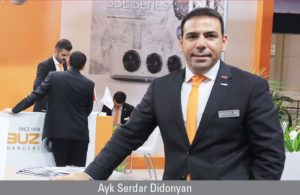 Sarbuz highlighted its agricultural evaporator during its participation in ISK Sodex, with Ayk Serdar Didonyan, Vice Chairman, Mechanical Engineer, Sarbuz, elaborating on how the product is especially designed to address the needs of the sector. “We are focusing and advising our customers, especially contractors, about the unit, because for agricultural products, they need high humidity,” he said. “The product is especially designed for high humidity and small delta T difference, and they can earn more money by spending very little, initially.”
Sarbuz highlighted its agricultural evaporator during its participation in ISK Sodex, with Ayk Serdar Didonyan, Vice Chairman, Mechanical Engineer, Sarbuz, elaborating on how the product is especially designed to address the needs of the sector. “We are focusing and advising our customers, especially contractors, about the unit, because for agricultural products, they need high humidity,” he said. “The product is especially designed for high humidity and small delta T difference, and they can earn more money by spending very little, initially.”
Didonyan said that while he believes the product will especially gain acceptance in countries with strong agricultural sectors, it is available for all markets. There are strong prospects in Russian-speaking countries and in Eastern Europe, he said. In addition to this product, Didonyan said, the company is dedicated to manufacturing copper tube and aluminum fin-type heat exchangers and is active in commercial and industrial refrigeration. “We have 50% turnover from our catalogue products, which are air-cooled condensers, dry coolers, evaporators and unit coolers,” he said. “The other 50% turnover is coming from our OEM coils that we manufacture according to customer needs and technical specifications.” He added that the company is currently exporting to more than 30 countries, including a strong presence in northern Africa and the Middle East
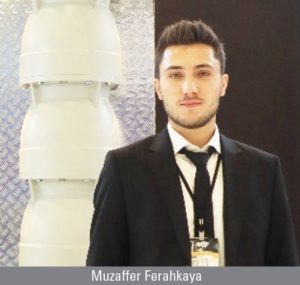 SEMPA
SEMPA
Sempa Pumps introduced its newest vertical turbine pump to visitors of ISK Sodex, with Muzaffer Ferahkaya, Asia Pacific Countries Export Specialist, saying that it is the first time the product made an appearance in the exhibition. The vertical turbine pumps can reach 4,000 cubic metres per hour and 100 metres at 60 hertz, Ferahkaya said. He added that although the vertical turbine pumps constitute a key focus for Sempa of late, the Turkish manufacturing company continues to reinforce its position in the market through the development of centrifugal pumps. He said that the company has a number of notable projects, globally, and is exporting to 70 countries
SIEMENS
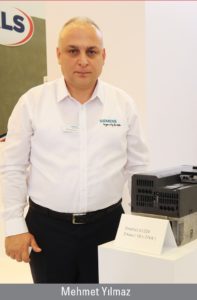 Siemens highlighted its range of frequency converters during the exhibition, with Mehmet Yılmaz, Product Marketing Group Manager, discussing, in particular, the SINAMICS G120X drive, for pump, fan and compressor applications in the water and wastewater, HVAC, irrigation and agriculture as well as in the industrial chiller and refrigeration segments. The solution, he said, is ideal for industrial applications, where there is a need for a high degree of protection from the corrosive atmosphere. Yılmaz also put the spotlight on the company’s integrated digital features, specifically its smart access module. “Digitalisation is a main topic for the industry, in terms of building and domestic applications,” he said. “The smart access module is our answer and highlights the digitalisation of our drive series.” As the drives support Wi-Fi connection, Yılmaz said that through the smart access module, technicians can connect their mobile phone directly to the drive for remote commissioning, which he said is the main highlight of the drives. In addition to streamlining the commissioning and installation process, he said, the drives go to higher frame sizes, such as 560 kilowatt motor
Siemens highlighted its range of frequency converters during the exhibition, with Mehmet Yılmaz, Product Marketing Group Manager, discussing, in particular, the SINAMICS G120X drive, for pump, fan and compressor applications in the water and wastewater, HVAC, irrigation and agriculture as well as in the industrial chiller and refrigeration segments. The solution, he said, is ideal for industrial applications, where there is a need for a high degree of protection from the corrosive atmosphere. Yılmaz also put the spotlight on the company’s integrated digital features, specifically its smart access module. “Digitalisation is a main topic for the industry, in terms of building and domestic applications,” he said. “The smart access module is our answer and highlights the digitalisation of our drive series.” As the drives support Wi-Fi connection, Yılmaz said that through the smart access module, technicians can connect their mobile phone directly to the drive for remote commissioning, which he said is the main highlight of the drives. In addition to streamlining the commissioning and installation process, he said, the drives go to higher frame sizes, such as 560 kilowatt motor
SPIROTECH (PART OF THE LU-VE GROUP)
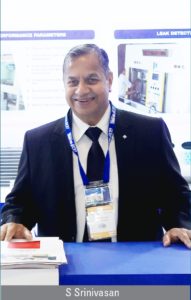 Spirotech Heat Exchangers showcased its range of coils and components during its participation in ISK Sodex. S Srinivasan, Managing Director, discussed how Spirotech’s manufacturing capability has grown substantially over the years, emphasising that the India-based company now has a production capacity of close to four million coils per annum and is manufacturing approximately 2.7 million coils, annually. Sharing company milestones, Srinivasan said the company was the first to introduce hydrophilic anti-corrosion fin material and 7mm heat exchangers to the India market in 1996. In 2012, he said, the company started making heat exchangers using tube aluminum fins and, soon after, microgroove heat exchangers. He said the company is planning to expand its current facility, which hosts 12 production lines, to increase production capacity. “Ninety per cent of our product revenue come from exports,” he said, adding that the company has presence and partners in Europe, North America, Middle East and China and that the participation in the exhibition is indicative of the strong interest from the Turkish market. Acquired by the Lu-Ve group in 2016, Srinivasan said, the company continues to help advance its presence in other global markets.
Spirotech Heat Exchangers showcased its range of coils and components during its participation in ISK Sodex. S Srinivasan, Managing Director, discussed how Spirotech’s manufacturing capability has grown substantially over the years, emphasising that the India-based company now has a production capacity of close to four million coils per annum and is manufacturing approximately 2.7 million coils, annually. Sharing company milestones, Srinivasan said the company was the first to introduce hydrophilic anti-corrosion fin material and 7mm heat exchangers to the India market in 1996. In 2012, he said, the company started making heat exchangers using tube aluminum fins and, soon after, microgroove heat exchangers. He said the company is planning to expand its current facility, which hosts 12 production lines, to increase production capacity. “Ninety per cent of our product revenue come from exports,” he said, adding that the company has presence and partners in Europe, North America, Middle East and China and that the participation in the exhibition is indicative of the strong interest from the Turkish market. Acquired by the Lu-Ve group in 2016, Srinivasan said, the company continues to help advance its presence in other global markets.
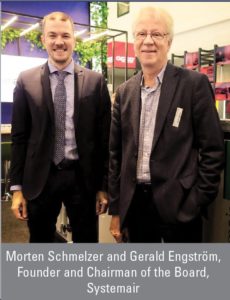 SYSTEMAIR
SYSTEMAIR
“At Systemair, we aim to integrate digital solutions, where they make sense for our clients,” said Morten Schmelzer, Technical Marketing Director. He discussed the company’s strategy to leverage technology to streamline design, installation, commissioning and maintenance of its solutions. Schmelzer also discussed what he called “the core of the unit”, which is the controller. “It is important to be able to communicate with various types of protocols,” he said. “You have machine interfaces, and the way two machines talk is important. For example, an air-handling unit communicating with the building management system might follow a third-party protocol. An integrated AHU controller coming from the manufacturer is essential, so that your unit can run as efficiently as possible.” Schmelzer emphasised that having a dynamically controlled ventilation that adapts to the requirements of the building in real time is at the heart of what makes units efficient. “It senses the conditions, allowing the unit to regulate itself, which then saves energy, recovers heating and cooling and provides a better indoor air,” he said. “It’s about controlling the solution, not just one product. We have the air distribution, the air-handling units, chillers and the like talking to one another, and that, at the end, makes a big difference in terms of energy efficiency.”
TYCO (JOHNSON CONTROLS)
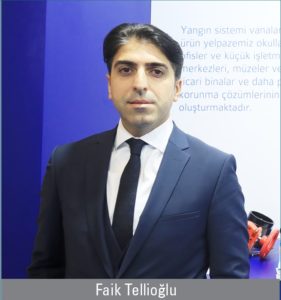 Faik Tellioğlu, General Manager, Fire Suppression Products, Tyco (a Johnson Controls company), said that the company highlighted its most recent innovation, a robotic sprinkler ideal for high-rise buildings. “For many high-rises, it may be difficult for the fire department to suppress fires, because they cannot reach them,” he said, pointing out that the robotic sprinkler is connected to the BMS system and finds the coordinates within the building, where there is an incident of fire, and suppresses it. “There is a control panel, and the system has UV detectors,” he said. “When they see the fire, they are commanding the sprinkler to go to the right place and the right direction.” Tellioğlu said that the product is ideal for cities such as Dubai, with many iconic high-rises, and that currently, the company is proactive in explaining the product’s benefits to end-users and highlighting the importance of investing in such equipment to protect building asserts. He added that stakeholders should not have to wait for ‘bad examples’ to invest in high-quality fire- and life-safety products.
Faik Tellioğlu, General Manager, Fire Suppression Products, Tyco (a Johnson Controls company), said that the company highlighted its most recent innovation, a robotic sprinkler ideal for high-rise buildings. “For many high-rises, it may be difficult for the fire department to suppress fires, because they cannot reach them,” he said, pointing out that the robotic sprinkler is connected to the BMS system and finds the coordinates within the building, where there is an incident of fire, and suppresses it. “There is a control panel, and the system has UV detectors,” he said. “When they see the fire, they are commanding the sprinkler to go to the right place and the right direction.” Tellioğlu said that the product is ideal for cities such as Dubai, with many iconic high-rises, and that currently, the company is proactive in explaining the product’s benefits to end-users and highlighting the importance of investing in such equipment to protect building asserts. He added that stakeholders should not have to wait for ‘bad examples’ to invest in high-quality fire- and life-safety products.
Copyright © 2006-2025 - CPI Industry. All rights reserved.